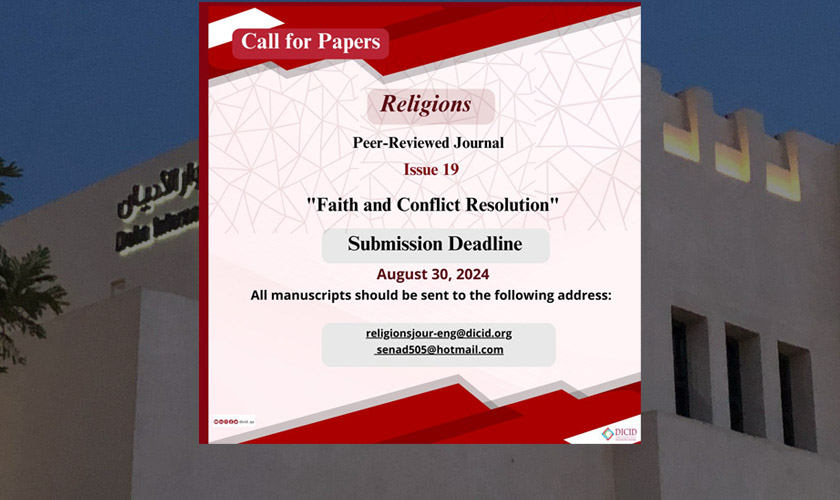
04 Jun An invitation to participate in the 19th issue of a peer-reviewed journal “Religions” entitled: Faith and Conflict Resolution
There is an increase in conflict and violence as a result of numerous clashes between different entities. Significant causes of conflict and war include unresolved regional conflicts, a collapse of the rule of law, the corruption within certain government or non-government institutions, weak economy, and resource scarcity. According to The International Committee of the Red Cross, two billion people faced violence, conflict, or fragility in 2018. The study also estimates that by 2030, half of these people will be living in extreme poverty; and that violence and war displaced 68.5 million people in 2017. Around the world, 120 million people depend on humanitarian assistance. According to the UN, civilian deaths in 12-armed conflict zones increased by 53% in 2022.
However, times of crisis and violence often lead to some of the most severe and thoroughly documented human rights violations. During conflicts, the basic needs for normal life such as water supply systems, food industries, housing infrastructure, educational institutions, and hospitals are greatly impacted and damaged.
Peace, on the other hand, is a universal aim, a common goal that transcends our worst moments and serves as the light of hope in the face of various challenges and hardship. Engaging in friendly and inclusive interfaith dialogue fosters a conducive foundation for unity, mutual understanding, and respect, allowing the seeds of peace to develop and grow.
Additionally, United States Institute of Peace Special Report indicates that in the 20th and 21st centuries, interfaith dialogue is becoming a more popular means of resolving conflicts and promoting peace. In its capacity as a peacebuilding institution, it has assisted in the resolution of numerous crises and conflicts, including the global engagement of imams and pastors.
Moreover, interfaith dialogue has the potential to unleash the power of religious prospects and provide people the right motivation, direction, and affirmation they need to shift toward peaceful resolution of conflicts. These dialogues and initiatives are becoming more and more crucial for people working to put an end to war and violent conflict everywhere.
DICID believes that each religious community may contribute uniquely to the shared goal of creative ideas for peacebuilding and coexistence, avoiding wars and human rights violations, and rebuilding society through interfaith dialogues. This is especially true when interfaith groups intervene in conflict areas. Dialogue aims to overcome misconceptions and negative assumptions that lead to negative feelings and behaviors, as well as justification for exclusion and discrimination.
The three world major religions – Islam, Christianity, and Judaism – all prioritize peace, harmony and coexistence. Nonetheless, the available literature provides less comprehensive documentation of the relationship between religion and peacemaking. Thus, the need to extend studies on how religious traditions can foster peaceful coexistence, prevent wars, and resolve conflicts. In many conflict resolution attempts, religious leaders and volunteers have proven to be valuable members of civil society, acting as peacebuilders or mediators.
The Torah states that: ﴾Declare, therefore, that I am granting him My covenant of peace﴿. Numbers 25:12. The Bible also mentions that: ﴾God blesses those who work for peace﴿ Matthew 5:9. It further says: ﴾ Peace I leave with you; my peace I give you ﴿ John 14:27. In Islam, we read the words of the Almighty: ﴾ If the enemy is inclined towards peace, make peace with them. And put your trust in Allah ﴿ 8:61. Qur’an also declares: ﴾So if they refrain from fighting you and offer you peace, then Allah does not permit you to harm them ﴿ 4:90.
In an effort to bridge this gap and assist DICID’s Religion and Peacemaking Initiatives and efforts, the Journal of Religions published by Doha International Center for Interfaith Dialogue has decided to choose the theme: Faith and Conflict Resolution for its upcoming edition (19th).
DICID encourages interested authors to explore the root causes of conflict, break down barriers, and promote peaceful coexistence among people of many religious traditions. We hope that this issue will contribute to the end of crises, wars, and conflicts while also furthering peacebuilding efforts.
The journal extends an invitation to distinguished writers to submit their scholarly and scientific papers on this significant subject in all of its different aspects while observing the following submission guidelines.
Manuscript submission guidelines
As part of the submission process, authors must adhere to the following guidelines:
1. The manuscript submitted to the journal should be an unpublished, original and written in either English or Arabic.
2. The length of the manuscript should be 10-15 pages (3000-5000 words) including references, footnotes, figures, etc.
3. The English manuscript should be written in Microsoft Word program with a font size of 14 Times New Roman, while the Arabic manuscript should be written in font size 16 Traditional Arabic.
4. “Religions” accepts book reviews as well as book translations. Book reviews should be at least 5 pages long, and translations should be at least 10 pages long.
5. All contributions should include an abstract written in no more than 200 words, followed with keywords.
6. The author should consistently adhere to one of the known citation styles for scientific papers (APA, MLA, Chicago, etc…)
7. The footnotes and references should be at the end of the research paper.
8. The author should attach his/her C.V together with the manuscript.
9. The journal will only communicate with the authors of the selected manuscripts.
10. The journal offers an honorarium for the selected works. The amount of the reward is determined by the editorial board.
11. The deadline for submission is August 30, 2024.
12. All manuscripts should be sent to the following addresses:
religionsjour-eng@teds.host
senad505@hotmail.com



Sorry, the comment form is closed at this time.